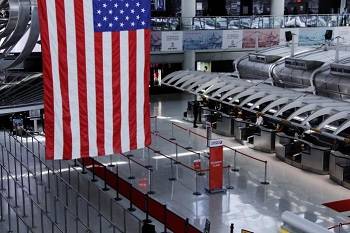Aviation experts are divided on the effectiveness of a US ban on large electronic items in hand luggage on flights inbound from a number of Middle Eastern states.
The US Department of Homeland Security announced the measure on Tuesday, citing the downing of an airliner in Egypt in 2015 and an attempt on a Somali passenger jet in 2016 using explosives smuggled on board.
A list of banned devices includes tablets, laptops, ebook readers and cameras, but not medical equipment and mobile phones.
The indefinite ban targets 10 airports in the Middle East and nine airlines, including Turkish Airlines and the major Gulf carriers: Emirates, Etihad and Qatar Airways.
"We have reason to be concerned about attempts by terrorist groups to circumvent aviation security and terrorist groups continue to target aviation interests," US officials said in a statement.
However, aviation experts have cast doubt on that explanation and warned of the new dangers the measure could pose.
Saj Ahmad, chief analyst at the aviation consultancy StrategicAero Research, told Al Jazeera the announcement "flies in the face" of US Federal Aviation Authority rules on the carrying of lithium batteries in a plane's cargo hold.
"[The rule] was put in place after the 2010 crash of a UPS 747 freighter in Dubai that caught fire while carrying such cargo," he said, before describing the immediate inconvenience the ban would cause for passengers.
"Airlines will of course comply, but delays will be seen at airports for customers not aware of the rule changes.
"Compliance will cause delays and add costs - it might even force passengers to drop plans to fly to the US or instead look for an alternative transit point through Europe so that their devices can be taken in the cabin as normal."
As the US ban currently applies, there is nothing stopping a passenger carrying the proscribed electronics boarding a flight to another region from one of the affected Middle Eastern airports, and later taking a connecting flight to the US, which Ahmad said demonstrated how "ill-conceived" the plan was.
"It does nothing to prevent security threats from places like France that have suffered a lot of terrorism in recent years - how would Homeland Security mitigate against a passenger from France with a device in the cabin in that situation?" Ahmad asked.
Gulf competition
The current US measure comes against the backdrop of US President Donald Trump's, as of yet, failed attempts to ban Muslims from several Middle Eastern states from entering the US, and also a fierce rivalry between Middle Eastern carriers and their American counterparts.
Ahmad said there was "merit [in the idea] that this ban could be seen as a way to stifle GCC [Gulf Cooperation Council] airline demand for travel to the US".
In the past year, US airliners have urged their government to act against Gulf carriers, which have expanded services to the United States and have been eating into market share.
As recently as last week, an advocacy group representing American airlines - including American, Delta and United - paid for an open letter to Trump to be placed in the New York Times and New York Post newspapers.
"The billions of dollars in illegal Gulf carrier subsidies are brazen violations of our Open Skies agreements and a perfect example of the type of trade cheating that President Trump abhors," Jill Zuckman, of the Partnership for Open and Fair Skies, said in the letter.
PHOTO CAPTION
A sign for Turkish Airlines stands near the counters inside of JFK International Airport in New York, U.S., March 21, 2017. REUTERS
Al-Jazeera


 Home
Home Discover Islam
Discover Islam Quran Recitations
Quran Recitations Lectures
Lectures
 Fatwa
Fatwa Articles
Articles Fiqh
Fiqh E-Books
E-Books Boys & Girls
Boys & Girls  Ramadan
Ramadan Fatwa Audios
Fatwa Audios Month of Mercy
Month of Mercy Women
Women Eed Al- Fitr
Eed Al- Fitr Food Recipes
Food Recipes Videos
Videos

 Prayer Times
Prayer Times












